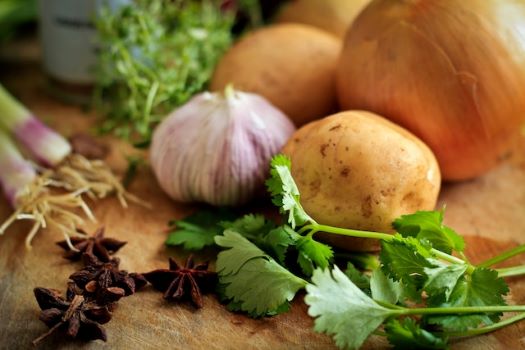Winter beckons! It’s that wonderful season of celebrations and gatherings. We all have images of the Turkey, the roast potatoes and the cranberry stuffing plus all the yummy vegetables and don’t forget the pumpkin pie! This year let’s give a thought to the herbs…
Herbs are the hidden magic in our family feast, the medicinal virtuoso, the health giving garnish we can take for granted!

Christmas herbs deserve our attention as the culinary heroes at the table, but which herbs should we choose and why? What do they do for our food flavours and what healthy benefits do they bless us with?
Rosemary
Traditionally used in turkey stuffing with other herbs Rosemary is a hidden gem in the kitchen. A nutritional powerhouse with anti-cancer properties, antibacterial and immune protective compounds. Plus the heady aroma of Rosemary evokes that Christmas feeling and the anticipation of the delicious feast ahead. Fresh rosemary sprigs can be lightly crushed and put into bottles of olive oil and drizzled over vegetables, meat and bread. Rosemary tea is good for digestion and is antimicrobial, it has been show to alleviate heartburn, gas and constipation.
Sage
What stuffing or poultry herb crust would be complete without sage. This heady, pungent herb is the mainstay of our traditional Christmas flavours. Did you know that it is also used as a preventative medicine for Dementia and Alzheimers? Research shows us that sage has positive benefits on cognitive skills and learning for all. It works as a mild anti-depressant and anxiolytic herb, improving symptoms of anxiety and sadness. Sage is anti-inflammatory and is used to treat asthma and bronchial issues. Even the botanical name Salvia comes from the Latin word ‘to heal’. Sage can be steeped in hot water, which when left to cool, can be used to gargle with to heal sore throats, hoarseness and swollen glands.
Chives
Many recognise chives as used in the turkey rub but what about shredding them finely and adding to butter and garlic to melt over your boiled potatoes or mashed swede/turnips. Chives belong to the allium family and are related to onions, garlic, scallions and ramsons (wild garlic). They are bursting with antioxidants which are essential for a healthy immune system, perfect for warding off Winter colds and flu.
Thyme
This herb actually comes from the mint family and was used by the Romans to treat depression. Thyme is full of vitamin C which is essential for a healthy immune system. The active ingredient in thyme is thymol. Thymol is anti-carcinogenic, anti-inflammatory and anti-bacterial. Thyme gives your immune system a real boost!
Mint
Magical mint has been used for centuries in folk medicine in countries across the world. As an excellent remedy for indigestion, the leaves can be chewed or a tea can be made by steeping the fresh leaves in hot water for ten minutes. Mint works well in place of chives with butter and potatoes or fresh leaves can be used to add a zingy edge to watermelon balls as a healthy, aromatic starter. Mint is antimicrobial and has been proven to kill off many well-known pathogens like E.coli and Salmonella. It also contains antioxidants which support your immune system. A formidable, medicinal remedy hidden in plain sight!
When we eat locally produced food, we automatically eliminate many threats to the quality of our diet. What our taste buds want and our health needs, is quality! We want to preserve the natural properties in the plant both for healing and culinary purposes. It’s easy enough to buy dried processed herbs but when we use fresh, locally grown herbs we get that invigorating flavour and bright colours.
When plants are cut for use, the vitamins and health-giving properties rapidly diminish.
High quality foods are an investment in our health and that of our loved ones, the perishable nature of fresh food belies the quality. Fresh food, grown further afield can be deceiving as the plants are cut before they are ripened. The ripening process is where the plant is allowed to develop its own natural flavour. This comes about because of the gradual uptake of nutrients and minerals in the ripening, making your food not only taste much better but also have much more nutrition and benefit to you.
Superfoods are defined as foods which contain a much higher level of nutrition than other plants, they are the superheroes of the plant world. Using a combination of fresh herbs in your diet regularly gives you an enormous range of nutrients and side-effect free medicine that you can trust is working for you on every level. Including regular plants and herbs in your diet has benefits that extend to your gut and digestive health. Herbs contain compounds that feed your good bacteria, balancing hormones and energy levels, having a positive, knock on effect on your sense of wellbeing and mood.

Winter ‘Immune-i-Tea’
Equipment
- 1 Kettle
- 1 Grater
- 1 Strainer
- 1 Cup or Mug
- 1 Tablespoon
- 1 Teaspoon
Ingredients
- orange or lemon peel
- juice of orange or lemon (or both if you have them)
- grated ginger
- fresh rosemary
- fresh mint
Instructions
- One tablespoon of each ingredient if dried, two tablespoons of each if the ingredients are fresh.
- Add one litre of almost boiled water to the ingredients (let it cool for 10 minutes if it has fully boiled before pouring over the tea mix).
- Let the mixture steep for 30 minutes then add the lemon/orange juice to the tea.
- Strain, stir and drink/sip throughout the day, as often as you like.
- You can add a teaspoon of raw honey to warm tea to sweeten as desired.
Notes

Herby Butter (for Turkey or Vegetables)
Equipment
- 1 Sharp Knife and chopping board
- 1 Small Food Processor
- 1 Pan
- 1 Ramekin optional
- 1 Stove
Ingredients
- 2 tbsp fresh sage leaves
- 2 tbsp fresh thyme leaves
- 2 tbsp fresh rosemary leaves
- 4 tbsp fresh parsley leaves
- ½ cup soft unsalted butter or coconut oil
- ½ onion
- 4 cloves of garlic
- salt
- pepper
Instructions
- Chop the onion and garlic finely.
- Fry the onion in a tbsp butter until softened and translucent.
- Add the garlic and lightly fry, mixing together well.
- Set aside to cool.
- Pulse all herb leaves together in a small food processor or finely chop with a knife.
- Mix the finely chopped herbs, butter or coconut oil and onion/garlic together well in a bowl.
- You can either transfer the mixture to a ramekin, pressing it well into the dish to chill in the fridge for later.
- It can be spooned onto piping hot vegetables, nut roast or meat at the table for a healthy herby addition OR it can be used to baste a turkey crown or other meats and baked with the meat to add flavour and tenderness.
Notes
Incorporating a variety of fresh herbs into our diets not only satiates our taste buds but also nurtures gut and digestive health. The compounds present in herbs contribute to a harmonious balance of hormones, increased energy levels, and an overall sense of wellbeing. As we celebrate the season of gratitude, let’s extend our thanks beyond the customary dishes and recognise the unsung heroes – the herbs – that weave both flavour and health into our festive feasts.
Main – Photo by Tima Miroshnichenko





